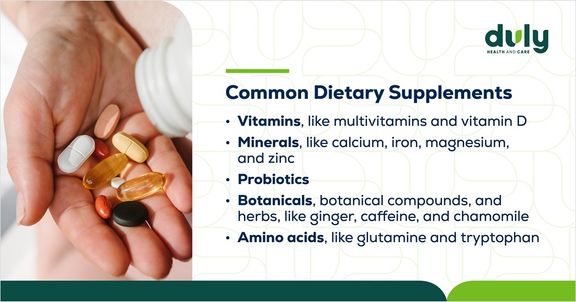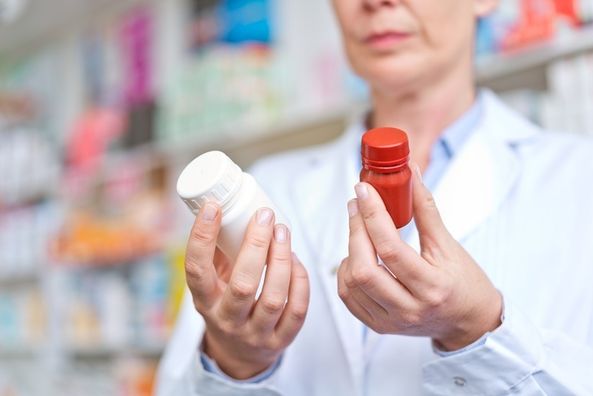Protein-packed shakes that “taste like chocolate!”, fruit-flavored multivitamin gummies, and bottle after bottle of vitamin tablets line the shelves of grocery stores. Shops dedicated to selling every vitamin and mineral under the sun seem to have popped up everywhere.
You’re not imagining things. Across the country, dietary supplement use is on the rise. Nearly 75% of Americans take at least one of the tens of thousands of dietary supplements on the market, according to a 2023 Council for Responsible Nutrition (CRN)/IPSOS survey.
Supplements promise to give you essential nutrients, help you sleep better, improve athletic performance, and support your overall health, with many claiming to be “all natural.”
Sounds great, right?
Well, you know the saying: If something seems too good to be true…
Before jumping on the supplement train, make sure to learn the truth about dietary supplements.
Types of Dietary Supplements
Dietary supplements are products that you add to your diet in addition to conventional food. They’re consumed via ingestion and come in many shapes and sizes, like pills, powders, liquids, bars, skin patches, and gummies.

Also read: The Low-Down on Low Magnesium
Risks of Dietary Supplements
Unless you have trouble getting nutrients naturally or your provider prescribes supplements, you might be wasting your money. There isn’t enough research to show that supplements are effective. The studies that have been conducted generally show that extra vitamins and minerals do not protect against disease or improve overall health in people who are otherwise healthy.
In addition to not always working, it can be risky to take dietary supplements.
A Word from Our Doctor
“As an avid researcher, I enjoy diving deep in the details of new cutting edge research in peer reviewed medical journals. I’ll do the heavy lifting for you, break it down into consumable pieces, and guide you through a plan to reach your goals in a straightforward, evidence based approach.”
– Alejandro Gonzalez, MD, Family Medicine Physician at Duly Health and Care
Need guidance on the best supplements for you? Duly Health and Care partners with Fullscript to take the guesswork out of supplements, giving patients access to safe, high-quality options. Schedule an appointment with one of our providers to learn more.
You Can Get Too Much of a Good Thing
Your body only needs a certain amount of each nutrient per day. When you go over that amount, there are several risks. For instance, here’s what could happen if you get too much of certain nutrients:
- Vitamin A: Nausea and vomiting, drowsiness, irritability, and beta-carotene supplements (a precursor of vitamin A) have shown an increased risk of lung cancer in current and former smokers, according to large trials (CARET, ATBC).
- Calcium: Irregular heartbeat, confusion, kidney damage, and increased risk of kidney stones or, rarely, milk-alkali syndrome.
- Niacin (Vitamin B3): long-term high dosing can lead to liver injury, ocular effects, and glucose issues (NIH).
- Biotin (Vitamin B7): often used for nail and hair growth, can interfere with lab tests, including troponin, leading to false results (FDA). Be sure to tell your clinician before labs if you are consuming this.
Supplements Can Interact With Other Medications
Be careful not to fall into the trap of thinking that, just because supplements are natural, they are safe – especially if you take daily medication or have certain medical conditions.
Just like medications, supplements can cause bad side effects if they are mixed with medications you are currently taking or other supplements. For example, St. John’s wort can reduce the effectiveness of other drugs, including many heart medications (blood thinners, statins, and heart rhythm medications). It can also affect medications that prevent organ transplant rejection, anti-HIV medications, and birth control pills by potentially causing breakthrough bleeding and increasing the likelihood of a woman getting pregnant.
Vitamin C and other antioxidant supplements have shown they may worsen outcomes in chemotherapy; it is recommended to discuss use with your oncologist if consuming. Taking vitamin E supplements when you’re on the blood thinner warfarin can result in an increased risk of bleeding, and some analyses have linked high-dose Vitamin E with increased risk of hemorrhagic stroke.
They Aren’t Regulated the Same Way as Medications
Dietary supplements are regulated by the US Food and Drug Administration (FDA), but not necessarily in the way you think.
Supplements are regulated by the FDA under the Dietary Supplement Health and Education Act (DSHEA). They’re not approved for safety or efficacy before marketing; manufacturers are responsible for safety and labeling, must follow cGMPs, and certain new dietary ingredients require a 75-day premarket notification. The FDA takes post-market action when needed if a supplement has been reported to cause harm after its been broadly available for consumption.
In other words the FDA has light regulation protocols for supplements that are not as stringent as medication regulations. Ultimately, they are responsible for monitoring supplements after they’ve hit the market to ensure they aren’t causing harm, inspecting manufacturing facilities, and, if needed, removing them from the marketplace.
Also read: Goodbye Dr. Google and Self-Diagnosis: 5 Pitfalls of Acting Like Your Own Doctor
Benefits of Dietary Supplements
Despite the risks, supplements aren’t necessarily off the table. There are times when supplements can be beneficial.
Supplements can help you meet your daily requirements for essential nutrients if you have trouble meeting those requirements naturally. In these cases, your provider may recommend over-the-counter supplements or prescribe stronger ones. For example, people following a vegan diet often don’t eat enough foods with vitamin B‑12.
As people get older, their skin has a harder time producing vitamin D. Situations like these can lead to deficiencies, which can cause problems ranging from fatigue to bone pain to irregular heartbeat. By taking supplements, you might be able to avoid deficiencies. When they’re taken correctly and safely, supplements may help with:
- Building strong bones and reducing bone loss, like Vitamin D along with Calcium found in foods.
- Having regular bowel movements if suffering from chronic constipation with psyllium as evidence by RTCs and meta-analysis (Pubmed).
- Slowing down vision loss in people with intermediate age-related macular degeneration (AMD), specifically AREDS2 formula (NIH).
Looking for a simple, clinician-curated starting point?
Duly providers recommend this General Health Support plan, featuring a high-quality multivitamin, omega‑3, and probiotic to support overall wellness.
Supplements and Pregnancy
During pregnancy, it’s critical to meet nutrient requirements. Nutrients help with a healthy pregnancy and protect your developing baby’s health. While diet is the best way to get these nutrients, pregnant women often fall short on nutrients. That’s where prenatal vitamins come in.
It’s recommended that women who are or may become pregnant take 400 mcg of folic acid daily, as well as 600 mcg of folic acid during pregnancy (CDC). Folic acid is the most important vitamin to take during pregnancy, as it reduces the risk of certain birth defects and supports a fetus’s growth and development.
Another very important vitamin during pregnancy is iron, 27 mg/day. Iron helps your red blood cells supply oxygen to the fetus. It can also decrease the risk of anemia (when your blood doesn’t have enough healthy red blood cells).
Depending on your needs during pregnancy, your provider may also recommend taking additional prenatal vitamins, such as calcium, vitamin D, or iodine.
Getting Those Nutrients In
Supplements should never replace a healthy diet. Whether you’re taking supplements or not, look for natural ways to get the nutrients you need through the foods you consume. Eat foods that are packed with essential nutrients, including fruits and vegetables, whole grains, and nuts and legumes.
Stay physically active, since exercise helps nutrients get where they need to go in your body. If you’re taking or are interested in taking supplements, make sure you follow these steps for taking them safely and maximizing their benefit.
- Only take supplements after talking to your provider or with a provider’s prescription.
- Follow dosing directions carefully and don’t take more than recommended.
- Never substitute a supplement for a prescribed medication.
- Let all your providers (including your primary care provider, specialists, and providers at immediate care centers or emergency rooms) know about any supplements you’re taking before labs or procedures.
The most important thing to do is to work hand-in-hand with your provider. They can help you find ways to get the nutrients you need, whether it’s adjusting your lifestyle, taking supplements, or a combination of both.
With Fullscript, Duly Health and Care providers can recommend safe, evidence-based supplements tailored to your needs. Schedule an appointment with one of our providers to discuss the best options tailored to your needs.
Need to be seen today? We offer same-day primary care appointments 7 days a week at our locations throughout Chicagoland.
This article was medically reviewed by Alejandro Gonzalez, MD.








